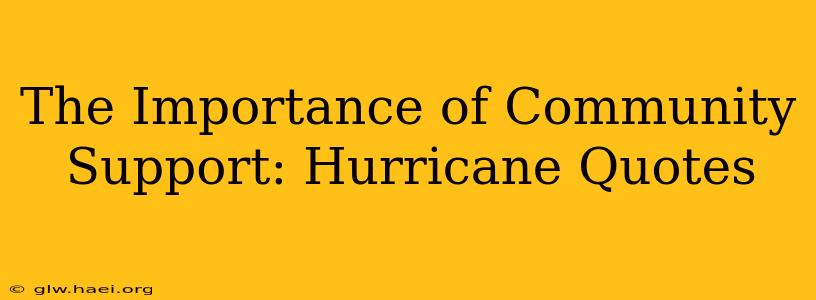The roar of the wind, the relentless pounding of rain, the chilling uncertainty – hurricanes are terrifying forces of nature. But amidst the devastation and fear, something truly remarkable often emerges: the unwavering strength of community support. It’s in those moments of crisis that the human spirit shines brightest, revealing the profound importance of neighbors helping neighbors. This exploration delves into the power of community in the face of hurricanes, weaving together poignant hurricane quotes with real-life examples.
What are some famous hurricane quotes?
Finding specific "famous" quotes solely dedicated to the importance of community support during hurricanes is tricky. Many powerful quotes about hurricanes reflect the raw emotion of the experience – fear, loss, resilience – but they don't always explicitly highlight the communal response. However, we can draw meaning from quotes that capture the essence of resilience and unity, applying them to the context of hurricane recovery. For example, a quote like "The oak sleeps in the acorn; the hurricane sleeps in the seed of the storm" (unattributed but commonly found online), while not explicitly about community, speaks to the powerful, latent potential for both destruction and, conversely, the strength that can emerge in response. That strength is often found in collective action.
How does community support help after a hurricane?
The aftermath of a hurricane is often a chaotic scene of destruction. Homes are damaged, infrastructure is crippled, and essential services are disrupted. This is where the crucial role of community support becomes crystal clear. Think of the immediate aftermath of Hurricane Katrina: while official aid struggled to reach everyone, it was the neighbors, the local volunteers, and community groups who provided the most immediate relief.
- Immediate Needs: Community support provides immediate, life-saving assistance. Neighbors share food, water, shelter, and medical supplies. They help clear debris, rescue stranded individuals, and offer comfort and support to those who have lost everything.
- Long-Term Recovery: The road to recovery after a hurricane is long and arduous. Community support continues to be vital, providing emotional, financial, and practical assistance for months, even years, afterward. This can include rebuilding homes, organizing fundraisers, and offering ongoing emotional support.
- Building Resilience: A strong sense of community fosters resilience. When people know they can rely on their neighbors, they are more likely to cope with the trauma and challenges of a hurricane. This collective strength is crucial for the emotional and psychological well-being of the community as a whole.
How can I help my community prepare for a hurricane?
Proactive community engagement is key to effective hurricane preparedness. This involves fostering a culture of preparedness and mutual support before the storm hits.
- Community Meetings: Organize meetings to discuss hurricane preparedness strategies, evacuation plans, and communication protocols. This fosters a sense of collective responsibility and empowers community members to actively participate in disaster planning.
- Volunteer Networks: Establish volunteer networks that can respond swiftly during and after a hurricane. Training volunteers in basic first aid, search and rescue, and debris removal is vital.
- Communication Systems: Develop robust communication systems to ensure that information can be shared effectively during emergencies. This might involve establishing a community communication hub or utilizing social media platforms.
- Mutual Aid Agreements: Encourage neighbors to establish mutual aid agreements, promising to assist each other during emergencies. This can range from sharing resources to providing shelter and transportation.
What are some examples of successful community responses to hurricanes?
Numerous examples showcase the powerful impact of community support following hurricanes. In the wake of Hurricane Harvey, countless individuals opened their homes to strangers, providing shelter and support. Following Hurricane Maria in Puerto Rico, community-based organizations played a critical role in delivering essential supplies and rebuilding infrastructure. These instances highlight the ability of communities to organize and assist, often surpassing the capacity of official aid in the immediate aftermath.
What are the long-term effects of community support after a hurricane?
The long-term effects of strong community support are profound and far-reaching. Beyond the immediate physical assistance, a cohesive and supportive community fosters:
- Faster Recovery: Communities with strong social networks tend to recover from hurricanes more quickly. This is because people are more likely to assist each other in rebuilding their lives and homes.
- Enhanced Resilience: The experience of collectively overcoming adversity strengthens community bonds and fosters greater resilience in the face of future challenges.
- Improved Mental Health: The social support provided by a strong community is crucial for the mental health and well-being of individuals affected by a hurricane. A sense of belonging and shared experience can significantly mitigate the effects of trauma.
In conclusion, the importance of community support during and after a hurricane cannot be overstated. While the destructive power of these natural disasters is immense, the human spirit's ability to rise above adversity, bolstered by collective action and mutual aid, underscores the enduring power of human connection. The strength found within a community provides not just survival but also the hope and resilience needed to rebuild lives and futures.

